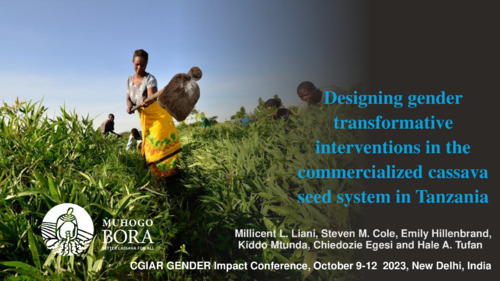Designing gender-transformative interventions in the commercialized cassava seed system in Tanzania
Abstract
Research on gender inequality in seed systems has underscored the need to build more inclusive interventions. For gender-transformative (GT) interventions in seed systems to succeed, there is urgent need to test new models which should be guided by empirical evidence. We present findings from research that unraveled the underlying causes that prevent women and youth from actively participating and benefiting as cassava seed entrepreneurs (CSEs). This study underpins the designing and testing of GT interventions as part of the Muhogo Bora cassava seed systems project in Tanzania. We employed participatory action research methods to facilitate 10 co-creation discussions with CSEs and community leaders across two districts in Kigoma and Tabora regions. Key constraints identified included—women’s and youth’s lack of access to land, financial capital, and agricultural extension services; women’s lack of decision-making powers and disproportionate involvement in unpaid care work, and gender-based violence—all of which are shaped by discriminatory formal and informal social institutions. CSEs and community leaders advocated for the use of interventions that create awareness of human and land rights, and the value of joint decision- making on the use of family income via community dialogues, local theaters, and radio stations. Youth capacities to run agribusinesses, and establishment of CSE associations for affordable credit were also emphasized. Local collaborators to support the GT interventions was proposed. Our study offers valuable insights for transforming cassava seed systems through community-led processes that aim to foster critical reflections about gender-based constraints, while establishing spaces and avenues for positive change.

